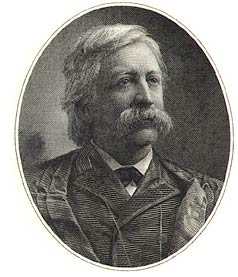 |
| Chief Justice Melville Fuller |
 |
| Fuller Court: |
| Biography: |
| Major Cases: United States v. E.C. Knight 1895 Pollock v. Farmer's Loan 1895 Plessy v. Ferguson 1896 Allgeyer v. Louisiana 1897 Lochner v. New York 1905 (Epstein, 2001) |
| 8th Chief Justice of the United States |
| Born: February 11, 1833 in Augusta, Maine Died: July 4, 1910 in Sorrento, Maine Education: 1853 Bowdoin College B.A. 1855 Harvard Law School 1856 Bowdoin College M.A. Employment: 1855-1856 practice in a private practice firm in Augusta, Maine 1855-1856 Editor of the Augusta Age 1856 President of the Common Council of Augusta, Maine 1856 City Solicitor in Augusta, Maine 1856-1888 practice in a private practice firm in Chicago, Illinois 1862 Delegate to the Illinois Constitutional Convention 1863-1865 elected as Illinois State Representative 1888-1910 appointed to the United States Supreme Court by President Cleveland 1910 died in office (Virtualology, 2002) |
| Melville Fuller was appointed Chief Justice of the United States Supreme Court without any prior judicial experience. (Warren, 1926) Even with this �handicap� he still presided on very famous cases that first year law students are required to know by heart. Chief Justice Fuller started the Conservative Court Era and it didn�t end until 1937 at the end of Chief Justice Hughes time. This Court �presented a vast variety of legal questions arising out of the new status of the United States as a world power and in control of territorial possessions, as well as out of the multitudinous attempts by State Legislatures and by Congress to solve by legislation the complex social and economic problems of modern times.� (1926) There were three broad classes of cases involving the constitution: 1. The power between the Federal Government and the State Government 2. The power between the State Government and Individuals 3. �Those involving the powers of the National Government under the Constitution over matters relating to which either the States have no authority or have authority only until Congress shall have decided to legislate.� (1926) One of the worst decisions in Fuller Court history and in the history of the Supreme Court was Plessy v. Ferguson. The irony is that the Fuller Court helped create the 14th amendment and the due process of the law. �The Fourteenth Amendment�s Due Process Clause as the principal safeguard of property rights, its Plessy decision ensured that the amendment was of little value to the blacks for whose benefit it had primarily been adopted.�(Schwartz, 1993) Plessy helped create separate but equal. This court helped build racial discrimination by voting against Plessy and helped establish the Jim Crow laws in the southern states that revolved around segregation. (1993) Associate Justice Harlan gave the dissent: �Our Constitution is color-blind, and neither knows nor tolerates classes among citizens.�(1993) It wouldn�t be until after the Civil Rights movement in the 1960s that African Americans could live in a country that didn�t have separate facilities blacks and whites. Even though Plessy v. Ferguson isn�t thought about favorably in our time and we have hindsight to see what we believe that he did wrong. Some people believe that the Fuller Court ruled the way they did because of the pressures that they were getting from the southern states, Congress and even the members of the Supreme Court were pressuring this issue to turn out the way that it did. (1993) The rest of the court cases that he presided over for the rest of his 22 years showed that he became a strict constructionist. This means that he followed the Constitution to the T, there was no interpretation, it was black and white with no gray. (Epstein, 2001) The Fuller Court isn�t looked down upon and it isn�t until recently (1960s) that the Fuller Court got negative attention.(Warren, 1926) It was a mistake on the part of a country that had just finished a strife and was now trying to dig themselves out of the ashes. It is just another part of history that we have to learn from. |